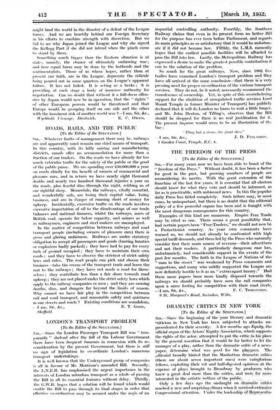LONDON'S TRANSPORT PROBLEM
[To the Editor of the SPECTATOR.] SIR,—Since the London Passenger Transport Bill was " tem- porarily " shelved after the fall of the Labour Government there have been frequent rumours in connexion with its re- consideration by the present Government, but there is still no sign of legislation to co-ordinate London's numerous transport undertakings.
It is well known that the Underground group of companies is all in favour of Mr. Morrison's amended Bill. Secondly, the L.N.E.R. has emphasised the urgent importance in the interests of London suburban transport as a whole of passing the Bill in all its -essential features without delay. Thirdly, the G.W.B. hopes that a solution will he found which would enable the Bill to pass through its final stages in order that effective co-ordination may be secured under the aegis of an impartial controlling. - authority. Fourthly, the Southern Railway claims that even in its present form no better Bill for the purpose has ever been before Parliament, and regards. its main principles as so satisfactory that it would be unfortun- ate if it did not become law. Fifthly, the L.M.S. earnestly hopes that the earliest possible facilities will be afforded to Pass the Bill into law. Lastly, the Metropolitan Railway has expressed a desire to make the greatest possible contribution it
canto the solution of the problem. • . ,
So much for the great railways. Now, since Ides five bodies have examined London's transport problem and they have all arrived at the samcconclusionthat there ilia very pressing need for proper co-ordination of the various transport services. They do not, be it noted, necessarily recommend the transference of ownership. . Yet, in spite of this overwhelming support for the abolition of unregulated traffic services Lord Mount Temple (a former Minister of Transport).has publicly declared that it will do London no harm to wait a little longer, and Mr. John Heaton, of Tilling's,. observes that the Bill should be dropped for there is no real justification for it. The present impasse would seem to be an illustration of the line
" Fling but a stone, the giant dies."
---I am, Sir, &e., J. D. FINI.AISON. I Garden Court, Temple, E.C. 4.






































 Previous page
Previous page